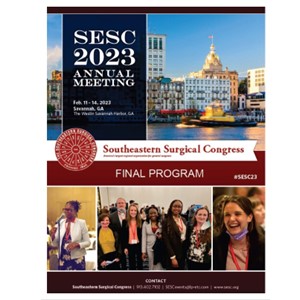General Surgery
Category: Plenary Session 9
Quickshot Oral : Plenary Session 9
69 - UTILITY OF ABBREVIATED SMALL BOWEL FOLLOW THROUGH IN THE MANAGEMENT OF SMALL BOWEL OBSTRUCTION
Tuesday, February 14, 2023
10:30am - 10:45am East Coast USA Time
- CC
- JP
JOHN PETERSON, DO
United States
Presenter(s)
Principal Contact(s)
Objectives: Small bowel obstruction (SBO) is the most common surgical disease of the small bowel and is the direct cause of approximately 12-15% of surgical admissions with 300,000 operations performed annually. In-hospital management of SBO results in healthcare costs exceeding 2 billion dollars per year. Despite the fact that SBO is a common surgical problem with a 60-70% nonoperative success rate, there are no strict guidelines or overwhelming consensus for the conservative management of small bowel obstruction. The goal of this study was to evaluate the utility of abbreviated small bowel follow through (SBFT) with water soluble contrast in the management of small bowel obstruction specifically in regards to decreasing hospital length of stay.
Methods: A retrospective chart review was performed on data sets obtained before and after the implementation of a standardized protocol for water soluble contrast administration for a trial of non-operative management. The first data set included 111 patients with SBO admitted to our facility from 6/2019-9/2019 prior to implementation of the suggested protocol. The post-implementation data set included 158 patients with SBO admitted to our facility from 3/2021-10/2021. The primary outcome was in-hospital length of stay. Standard statistical analyses were performed and pre-specified.
Results: For patients that were managed strictly nonoperatively, the mean length of stay (LOS) was 8.3 days prior to protocol implementation and 4.8 days following protocol implementation (p-value <.0001). Comparatively, patients admitted after protocol implementation were more likely to have a CT scan with PO contrast on admission (98.1% vs 90.1%; p-value <.005), to undergo NG tube decompression (84.7% vs 68.5%; p-value <.005), and to be administered water soluble contrast with abbreviated SBFT (75.3% vs 37.8%; p-value <.0001).
Conclusion: Implementation of a standardized protocol utilizing abbreviated SBFT with water soluble contrast for the management of SBO at our institution resulted in a significant decrease in average length of stay for patients definitively managed in a nonoperative fashion.
Methods: A retrospective chart review was performed on data sets obtained before and after the implementation of a standardized protocol for water soluble contrast administration for a trial of non-operative management. The first data set included 111 patients with SBO admitted to our facility from 6/2019-9/2019 prior to implementation of the suggested protocol. The post-implementation data set included 158 patients with SBO admitted to our facility from 3/2021-10/2021. The primary outcome was in-hospital length of stay. Standard statistical analyses were performed and pre-specified.
Results: For patients that were managed strictly nonoperatively, the mean length of stay (LOS) was 8.3 days prior to protocol implementation and 4.8 days following protocol implementation (p-value <.0001). Comparatively, patients admitted after protocol implementation were more likely to have a CT scan with PO contrast on admission (98.1% vs 90.1%; p-value <.005), to undergo NG tube decompression (84.7% vs 68.5%; p-value <.005), and to be administered water soluble contrast with abbreviated SBFT (75.3% vs 37.8%; p-value <.0001).
Conclusion: Implementation of a standardized protocol utilizing abbreviated SBFT with water soluble contrast for the management of SBO at our institution resulted in a significant decrease in average length of stay for patients definitively managed in a nonoperative fashion.

